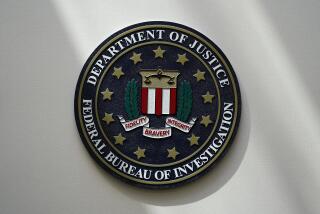Spy Suspect Bloch Quits State Dept. Post but U.S. to Press for Dismissal
- Share via
WASHINGTON — Felix S. Bloch, the senior U.S. diplomat suspected of spying for Moscow, tendered his resignation earlier this month, but the State Department said today that it will press on with proceedings to dismiss him for national security reasons.
“The department has informed Mr. Bloch it will continue with the proceedings initiated last February to remove him from the Foreign Service for national security reasons. The department will take no action on Mr. Bloch’s tendered resignation pending the outcome of these proceedings,” spokesman Richard Boucher said.
The Austrian-born Bloch, who worked in the U.S. Foreign Service for 30 years, was accused last year of passing secrets to the Soviets, probably while he was in the No. 2 post at the U.S. Embassy in Vienna. He has not been formally charged with espionage.
Bloch had requested a State Department hearing when the government decided to remove him from its employ last February.
Boucher said that the hearing was scheduled to take place July 9 and that the State Department had provided Bloch’s lawyer with a list of the witnesses and evidence it intended introducing.
“On July 5, Mr. Bloch withdrew his request for a hearing and tendered his resignation,” Boucher said.
Bloch, 55, who lives in Washington, could not be reached for comment. FBI spokesman Bill Carter said, “We don’t comment on investigations.”
Boucher declined to say whether Bloch gave a reason for his resignation.
The next stage is for the State Department to submit a record of the case to Secretary of State James A. Baker III, who would take the final decision to dismiss Bloch on national security grounds, he said.
When the espionage allegations surfaced a year ago, Bloch was pursued with equal vigor by the media and the FBI, but he would not comment.
Bloch was put on paid leave last summer from his State Department position as “minister counselor” in the Foreign Service, then demoted to unpaid status in February on the ground that he was a national security risk, losing his $80,000 annual salary but officially keeping the job.
In media interviews, Bloch was always cryptic, refusing to discuss tapes that showed what appeared to be a hand-over of secret information.
Officials believe that Bloch was recruited by the KGB in 1974 when he worked in the U.S. Embassy in East Germany.
Bloch was deputy chief of mission in Austria from 1983 to 1987 and had access to the most sensitive U.S. intelligence and policy documents.
He was then transferred to Washington, but his career shuddered to a halt last summer when ABC television reported the top-ranking diplomat had been taped in 1989 in Paris, apparently passing a briefcase to a KGB officer.
Bloch reportedly said the briefcase contained stamps.
Prosecutors said they had also taped a phone conversation between Bloch and his wife indicating that he had received money from Moscow.
Last summer Bloch was put under a 24-hour surveillance, by the FBI and reporters, that became known as the Bloch-watch.
His apartment in a fashionable diplomatic neighborhood in Washington became a temporary camping ground for photographers and reporters, who watched Bloch’s every move and accompanied him on his daily walks, some as long as 22 miles.
More to Read
Sign up for Essential California
The most important California stories and recommendations in your inbox every morning.
You may occasionally receive promotional content from the Los Angeles Times.













